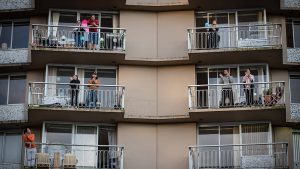For several weeks, we’ve seen a well-deserved outpouring of support for our “front line workers.”
Nurses, doctors, and EMTs. Cashiers and food stockers in supermarkets. Teachers who had to swiftly devise online curricula to keep at-home students busy. Transit workers operating trains and busses. Food workers, from processing plants to restaurants. Delivery drivers and postal employees.
I’d like to think that, when we’ve made it through the COVID-19 crisis, we won’t forget the important work that those people and many others have done. But history tells us that’s unlikely to be the case.
Many of our front line workers are themselves living on the financial brink, earning low pay and few benefits while toiling away for employers who have not guaranteed them safe workplaces. While you and I shelter at home, they are forced to go to jobs where their lives are on the line, where dozens (or hundreds) of their colleagues have been stricken with coronavirus. If they don’t show up, it’s considered (by the governor of Iowa and other red states) to be a “voluntary quit,” which means they become ineligible for unemployment insurance. And when they do become ill, good luck paying the massive hospital invoices after they’ve lost their job-connected health insurance.
Meanwhile, the industries they work in lobby Congress to provide legal immunity — not for the workers, but for the corporations. In other words, even if you do put your health-related apprehensions aside and show up for your shift, you couldn’t sue your bosses when you get sick. Your family wouldn’t be able to take legal action if you die, either.
If that’s the reality now, what makes anyone believe it will be better later? I think there’s a pretty good analogy to the way the members of our military are treated. When they go off to war, we’re all about “Support the troops,” and tell veterans, “Thank you for your service!” But the truth is that, once they’ve returned to civilian life, we give them very little thought. We don’t have a national program incentivizing companies to hire those who’ve worn our uniform. We don’t have a national mental health safety net to help vets who end up homeless and suicidal. We don’t have a VA hospital system that fulfills our promise of caring for them, particularly those still suffering from PTSD and TBI long after they’ve returned from war.
It’s nice to stand on your balcony or front porch and join your neighbors in a nightly ritual of applauding front line workers. It’s nice to see streaming videos of performances dedicated to them. It’s nice to retweet and like social media memes offering praise for them. It was nice for the Thunderbirds and Blue Angels to do flyovers last week.
But those are mere gestures. Gestures that don’t help pay the rent or mortgage, nor provide the personal protective equipment they need, nor ensure that they’re all tested to see if it’s safe for them to be in the workplace, nor provide paid sick leave.
Those who have served on the front lines deserve better, whether in a village in Afghanistan or a meat processing plant in Sioux Falls.

